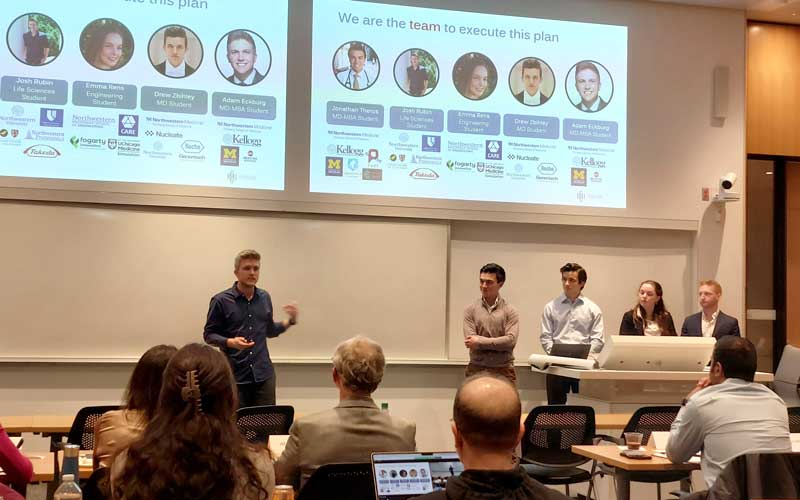Guardians of the Heart
Through NUvention: Medical, five Northwestern students created CardioGuardian, an accessible screening tool for heart failure.

Walking into NUvention: Medical for the first time in August 2023, Northwestern University MD-MBA student Adam Eckburg (Feinberg/Kellogg ’25) had no idea what awaited him.
Like so many before him, Eckburg knew the basics of NUvention: Medical. One of the signature courses at Northwestern’s Farley Center for Entrepreneurship and Innovation, NUvention: Medical immerses students in the process of developing and commercializing new medical technologies – from ideation and customer discovery to considering industry regulations and refining a pitch.
Eckburg was eager to explore innovation and entrepreneurship in medicine alongside other like-minded students and excited NUvention: Medical offered that very opportunity.
A year later, Eckburg is now the CEO of an upstart medical device company called CardioGuardian. Its namesake product, a smart scale that blends established cardiac sensing with a novel machine-learning model to screen for asymptomatic heart failure, aims to improve patient outcomes and reduce emergency room visits for heart failure exacerbations.
“I can’t say I saw this coming, but I’m glad it did,” Eckburg said.
Defining the problem
In NUvention: Medical, Eckburg and his teammates – medical students Andrew Zbihley (Feinberg ’25) and Jonathan Theros (Feinberg/Kellog ’25) as well as undergraduates Emma Rens (McCormick ’24) and Josh Rubin (Weinberg ’24) – quickly rallied around a problem detailed by their clinical mentor, Anjan Tibrewala.
A cardiologist at Northwestern Medicine and assistant professor at the Feinberg School of Medicine, Tibrewala lamented the lack of early detection tools for heart failure. The team’s other clinical mentor, Luke Neill, an emergency medicine physician at Northwestern Medicine and adjunct lecturer at the Farley Center, echoed Tibrewala’s frustration, particularly as the absence of credible early detection resulted in emergency room visits.
A condition affecting some 6.5 million US adults, heart failure accounts for about one-third of all cardiovascular disease deaths, according to the Heart Failure Society of America. As with many health conditions, early detection can prevent more significant and often emergent downstream medical issues, including heart attacks.
“If we could help with early detection, then we could help a lot of people avoid traumatic events,” Rubin said.
The team immediately reviewed current technologies addressing early detection of asymptomatic heart failure, including the patent landscape. And just as Tibrewala and Neill had noted, the students identified a clear gap in the market.
Developing a solution
In brainstorming a potential screening tool, the students interviewed numerous providers, including primary care physicians, emergency medicine physicians, and cardiologists. They also researched the leading factors contributing to heart failure exacerbations. Those efforts steered the development of CardioGuardian.
The smart scale they designed integrates multiple measures of cardiac activity, including electrocardiography and thermal scans, to yield a numerical risk score for heart failure. That number offers providers a clear-cut data point to understand an individual patient’s threat-level and can also be used to flag the patient for further testing, if not immediate interventions.
Through NUvention: Medical, the CardioGuardian team crafted a business plan, defining everything from their market niche and value proposition to clinical deployment. They also leveraged interprofessional relationships to help build a physical product.
“Creating something like this, you inevitably face challenges, and you learn something about the tenacity it takes to problem solve,” Eckburg said.
Last spring, the CardioGuardian team entered VentureCat, Northwestern’s annual student startup competition, and captured a semi-finalist nod in the Life Sciences & Medical Innovation category. Though CardioGuardian fell short of reaching the VentureCat finals, the group received unanimous feedback about the compelling promise of its idea, the strength of its business model, and its necessary next step, namely gathering medical data to ensure a relevant, trustworthy algorithm.
Forging ahead
To seize its potential, CardioGuardian, which formally incorporated as a business in May 2024 with Eckburg as CEO and Zbihley as president, is currently pursuing data collection approval from Northwestern’s Institutional Review Board, a necessary step for any research projects involving human subjects. The data CardioGuardian derives from its preliminary studies will help the team enhance its methods of predicting heart failure risk and solidify the product’s feasibility.
For Rens, the team’s unrelenting focus on market viability is the direct result of deep reflection and learning in NUvention: Medical.
“I had previously thought engineering and perfect product development served as the backbone of a successful medtech startup,” Rens said. “However, through NUvention I learned that the business development is an even bigger piece of the puzzle.”
As the group continues to pursue funding through grants and investors, Eckburg is excited by CardioGuardian’s progress and its prospects. He said recent months have strengthened his interest in combining his medical and entrepreneurial experience to help patients in tangible ways throughout his career.
“From an experience like this, you see a way to take problems doctors identify and transform them into relevant solutions,” he said.
